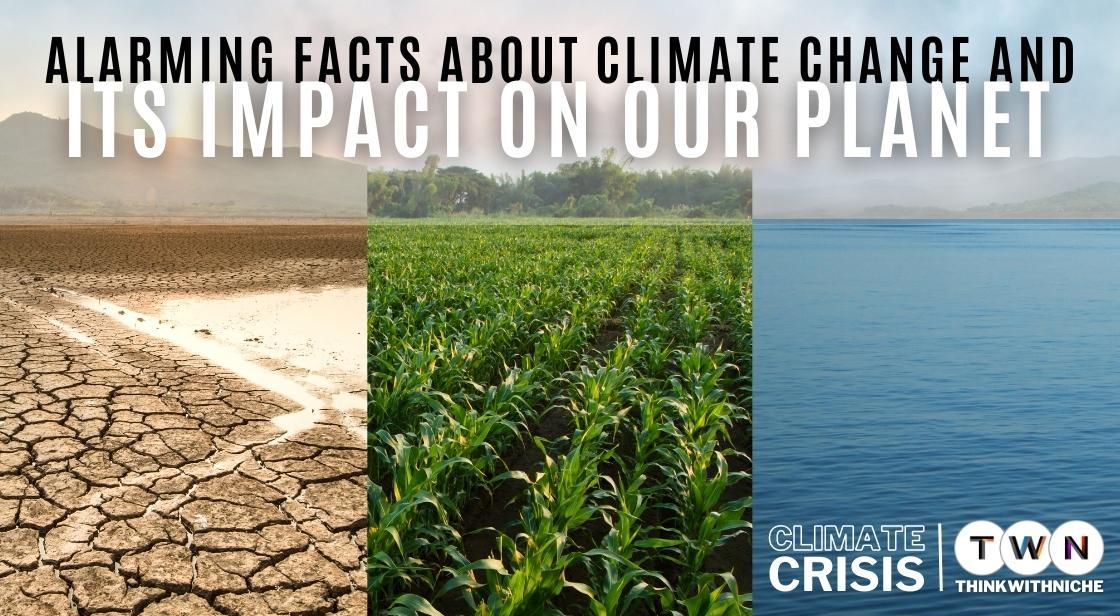Alarming Facts About Climate Change and its impact on our planet

Blog Post
Climate change is a long-term change in the average weather patterns that have come to define Earth's local, regional and global climates. These changes have a broad range of observed effects that are synonymous with the term.
Climate change is a significant and lasting change in the statistical distribution of weather patterns over periods ranging from decades to millions of years. It may be a change in average weather conditions, or in the distribution of weather around the average conditions (i.e., more or fewer extreme weather events).
Climate change is caused by factors that include oceanic processes (such as oceanic circulation), variations in solar radiation received by Earth, plate tectonics and volcanic eruptions, and human-induced alterations of the natural world; these latter effects are currently causing global warming, and "climate change" is often used to describe human-specific impacts.
"97% of climate scientists agree that climate change is caused by human activities."
Despite the sobering statistics and clear signs of a planet in crisis, our collective response has been woefully inadequate. The time for denial and delay is long past. It's time to face the reality of climate change and to act with urgency.
We must drastically reduce our greenhouse gas emissions, transition to renewable energy, and invest in climate adaptation and resilience
Are you ready for a wakeup call? If you haven't noticed yet, our beloved planet is in the throes of an escalating climate crisis. This isn't merely an issue we can shove aside for future generations to solve. No, the impact is glaringly visible, right here, right now.
It's a truth we've known for some time: Our Earth's temperature has been on an unswerving upward trajectory for over a century.
This isn't some dystopian future we're painting; it's our present reality. We've all seen the headlines - extreme weather events, surging sea levels, altered ecosystems.
But are we truly understanding what this means for our planet?
Let's delve deeper and ask ourselves - are we prepared to act before the clock runs out?.
The clock is ticking, and the future of our planet depends on our actions.
Dive into the alarming facts about climate change and discover the potentially devastating impacts it could have on our planet if we don't act now.
Imagine a world where summers scorch the earth, while winters rattle your bones with an unparalleled chill. Picture a future where storms and hurricanes become the norm, not the exception. This isn't a dystopian fantasy; it's a glimpse into a not-so-distant future if we fail to address climate change.
Climate change is the ticking time bomb sitting at our doorstep, a harsh reality we can no longer afford to ignore.
Our beloved Earth is running a fever, and it's getting worse. The planet's temperature has been steadily spiraling upwards for over a century. But this isn't just a number on a thermometer—it's the harbinger of more extreme weather, higher sea levels, and profound shifts in plant and animal life.
A world reshaped by climate change isn't a 'maybe' or a 'what if'? It's an 'already happening'. It's the here, the now, the woeful chorus of "we told you so" from scientists around the globe.
Heatwaves scorching the globe? Check.
Intense hurricanes and storms becoming an annual event? Check.
Sea levels creeping upwards, threatening coastal communities? Check.
Unpredictable shifts in plant and animal life? Check and check.
If this sounds like a grim reality, it's because it is. We're staring down the barrel of a loaded gun, and it's high time we disarm it. The fight against climate change isn't about saving the planet; it's about saving ourselves.
Alarming Facts About Climate Change and its impact on our planet
Science of Climate Change: Understanding the Causes and Effects
Ever wondered why our planet is getting warmer? The answer lies in the science behind climate change. The Earth's climate has always experienced ups and downs, but recent trends show an unusual and rapid increase in global warming.
Greenhouse gases are the main culprits behind the Earth's escalating temperature. These gases, such as carbon dioxide and methane, trap heat from the sun in the Earth's atmosphere, leading to a 'greenhouse effect'. Human activities, notably burning fossil fuels and deforestation, are significantly adding to these gases.
The Rising Temperature: How Global Warming is Impacting the Planet
When we talk about climate change, one of the most pressing issues is certainly the Earth's rising temperature. It's not just an assumption or a prediction - it's a verified fact. Our planet has been getting hotter at an unprecedented rate over the past century.
The cause? The majority of scientists agree that it's largely due to human activities, particularly the burning of fossil fuels and deforestation. These actions increase the concentration of greenhouse gases in the atmosphere, trapping heat and leading to an overall increase in Earth's average temperature - a phenomenon known as global warming.
But how does this temperature rise impact our planet? Let's dive in.
-
More Extreme Weather Events
One of the most visible impacts of global warming is the increasing frequency and intensity of extreme weather events. Heatwaves are becoming hotter and longer, while storms, hurricanes, and floods are becoming more destructive. These changes not only pose immediate threats to human life, but also lead to long-term problems like food and water shortages, and damage to homes and infrastructure.
"Global sea levels could rise by up to 3 feet by the end of the century."
-
Rising Sea Levels
As temperatures rise, so do sea levels. This is due to two main factors: the melting of land ice (like glaciers and ice sheets) and the thermal expansion of sea water as it warms. Rising sea levels pose a major threat to coastal cities and islands, potentially displacing millions of people and causing billions of dollars in damage.
-
Changes in Plant and Animal Life
Global warming is also disrupting the delicate balance of ecosystems around the world. As habitats change and shift due to rising temperatures, many plant and animal species are struggling to adapt. Some are being forced to migrate, others are seeing their population numbers plummet, and sadly, some are facing the real threat of extinction.
These impacts of global warming are already being felt around the world, and if we don't take action, they'll only get worse. Climate change is not a distant, abstract problem - it's happening here and now, and it affects each and every one of us. The time to act is now.
Also Read: Climate Change and its Impact on Global Business Landscape
Extreme Weather Events: Heat Waves, Hurricanes, and Droughts
As our planet heats up, we're witnessing a spike in extreme weather events. From scorching heatwaves to destructive hurricanes, the climate change is putting on quite a catastrophic show. And let's not forget the severe droughts that leave the land parched and lifeless.
-
Heat Waves:
Heat waves, those prolonged periods of excessively hot weather, are becoming more frequent and more intense. They're not just uncomfortable, they're deadly. In fact, heat waves have caused more deaths in recent years than any other weather-related events.
-
Hurricanes:
Then we have hurricanes, nature's most destructive storms. As temperatures rise, so does the intensity and frequency of these cyclones. Ocean warming is the main culprit, supercharging hurricanes and making them more deadly.
-
Droughts:
Droughts, the silent killers, are also on the rise. These periods of abnormally dry weather can last for months, or even years, leading to widespread water shortages, crop failures, and wildfires. Climate change is exacerbating drought conditions, particularly in already dry regions.
To put it simply, the impacts of these extreme weather events are far-reaching and devastating. They disrupt ecosystems, threaten agriculture, and pose a grave risk to human life. And with the current pace of global warming, they're only going to get worse.
Melting Ice Caps and Rising Sea Levels: The Threat to Coastal Cities
Imagine New York City, Venice, or Shanghai, partially submerged in water. It's a chilling image, isn't it? Yet, it's a future that could become reality if the melting of polar ice caps and rising sea levels continue at their current pace.
-
The Polar Regions: Earth's Cooling System
Let's take a step back and understand why these polar ice caps matter. In essence, they act as the Earth's cooling system. The white surface of the ice caps reflects sunlight back into space, helping to maintain the planet's temperature. But as the ice caps melt, the darker ocean water absorbs more sunlight, leading to further warming.
-
Sea Level Rise: Creeping Danger
As these ice caps melt, they add more water to the world's oceans, causing sea levels to rise. This isn't just a slow, steady process. It's accelerating. Data shows that the rate of sea level rise has more than doubled from 0.06 inches per year throughout most of the 20th century to 0.14 inches per year from 2006–2015.
"Imagine the world's greatest cities, home to millions, slowly drowning. It's a sobering picture of our potential future."
-
The Threat to Coastal Cities
Coastal cities worldwide face significant risks. More frequent and severe flooding, accelerated coastal erosion, and even land submersion are real threats. It's not just about losing land; it's about losing homes, cultural heritage sites, and vital infrastructures like hospitals and power plants.
The Loss of Biodiversity: How Climate Change Affects Plant and Animal Life
Picture this: a world where once-buzzing forests fall silent, and vibrant coral reefs bleach into ghostly underwater wastelands. This isn't a plot from a dystopian novel, but a very real scenario as a result of climate change. The loss of biodiversity - the variety of plant and animal life in the world - is one of the most alarming, yet often overlooked, consequences of our warming planet.
-
The Tragic Bees' Tale
Consider the plight of our little buzzing friends: bees. These industrious insects play an enormous role in our food production, as they're responsible for pollinating about one-third of the food we eat. However, a warming climate, combined with other stressors, is causing declines in bee populations worldwide.
-
The Silent Forests
It's not just bees. Widespread deforestation and rising temperatures are disrupting ecosystems, pushing many species towards extinction. Our once-lush forests are growing eerily quiet, as many birds and other animals struggle to survive in a rapidly changing environment.
-
The Ghostly Reefs
The ocean isn't spared either. Climate change is causing our oceans to warm and become more acidic, devastating coral reefs. These underwater ecosystems are home to 25% of all marine life, and their loss would be catastrophic.
"But why does biodiversity matter?" you might ask. Biodiversity is crucial for a healthy planet. It helps to regulate the climate, filters water, recycles nutrients, and provides us with food. Our loss is, ultimately, a loss for the planet.
Climate change isn't just about hotter summers and more intense storms. It's about the very web of life that sustains us all. By taking action against climate change, we're not just saving polar bears or penguins – we're saving ourselves.
Climate Change: A Catalyst for Refugee Crisis
The repercussions of climate change are profound and wide-ranging, with one of the most alarming being the creation of a refugee crisis. The escalating temperatures, erratic weather patterns, and rising sea levels are not only devastating our natural world, but also threatening human civilization. This has an enormous impact on people's livelihoods, especially those who are dependent on natural resources.
-
The Implications of Climate Change on Human Migration
When the environment transforms, people are often forced to move. This is nothing new – our history is filled with examples of communities migrating due to changes in their environment. However, the scope and scale of displacement caused by the modern climate crisis is unprecedented.
"Climate change is creating a new category of refugees – environmental refugees. These are people forced to leave their homes because of drought, flooding, or other severe weather that's now becoming increasingly common."
-
Climate Change Refugees: A Global Challenge
Imagine being forced to leave your home because the land you've lived on for generations is no longer arable, or because your village has been washed away by sea-level rise. This is the reality for millions of people worldwide. They are not just statistics – they are real people with real stories.
Droughts in Sub-Saharan Africa: Prolonged periods of drought have made farming untenable in many regions, leading to widespread displacement as people search for more fertile lands.
Floods in South Asia: Increasingly intense monsoon rains have resulted in recurrent flooding, destroying homes and displacing millions.
Sea-level rise in the Pacific Islands: Rising sea levels are causing the slow submersion of islands, forcing the inhabitants to become climate refugees.
Climate change isn't just an environmental issue – it's a humanitarian crisis. By combating climate change, we're not just protecting our planet; we're safeguarding countless lives and futures. The time for action is now.
Our Planet's Overburdened Resources
We are depleting the Earth's resources much faster than it can regenerate them. Earth Overshoot Day marks the date when we've consumed more from nature than our planet can recover in the entire year. Alarmingly, this date arrives earlier every year, a sobering reminder of our unsustainable consumption rates.
-
Climate Change: A Humanitarian Crisis
Climate change isn't just about melting ice caps and rising temperatures. It's a humanitarian crisis with far-reaching consequences. The impacts of climate change are felt most keenly by the most vulnerable populations, amplifying existing inequalities.
By combating climate change, we're not just protecting our planet; we're safeguarding countless lives and futures.
The Economic Impact of Climate Change: The Cost of Inaction
Ever wondered about the price tag on climate change? It's not just our earth that pays; it's our economy too. The cost of inaction is astronomic, and it's time we crunch the numbers.
-
The Direct Costs
Climate change brings about a myriad of direct costs. From health care expenses due to heat-related illnesses to infrastructure damage from intensifying storms, these are immediate, tangible costs we can't ignore. It's a drain on our global economy, and it's growing by the day.
-
Indirect Costs
Then there are the indirect costs - the ones that sneak up on you. Changes in agricultural production due to unpredictable weather patterns, shifts in labor productivity due to extreme heat, and the impact on tourism in areas affected by extreme weather events. The ripple effect is vast and far-reaching.
"The cost of doing nothing is far greater than the cost of taking action." - Anonymous
-
Future Costs
And let's not forget the cost to our future. Think about the economic impact of losing entire coastal cities to rising sea levels or the loss of biodiversity affecting our food chain. These are not just hypothetical scenarios; they are real threats that carry enormous economic implications.
According to the National Bureau of Economic Research, if we continue on our current path, climate change could reduce global GDP by 7.22% by 2100. That's a price we can't afford to pay.
It's clear that the economic impact of climate changeis staggering. As temperatures rise, so do the costs. From increased healthcare expenses due to heat-related illnesses, to the billions spent on rebuilding after climate-induced natural disasters, we are already paying a high price.
UN Intergovernmental Panel on Climate Change (IPCC) Report
We stand at a crucial crossroads in the history of our planet. According to a report conducted by the UN Intergovernmental Panel on Climate Change (IPCC), if we do not take urgent action, the catastrophic effects of global warming could become irreversible by 2030. Our choices today will shape the world for future generations.
"Climate change is the defining issue of our time and we are at a defining moment. From shifting weather patterns that threaten food production, to rising sea levels that increase the risk of catastrophic flooding, the impacts of climate change are global in scope and unprecedented in scale."
But what does this mean in practical terms? Let's break it down:
Rising global temperatures could lead to more droughts, heatwaves, and extreme weather events
Sea levels could rise by up to 1 meter by the end of the century, putting coastal cities at risk
Changes in climate could lead to shifts in plant and animal life, threatening biodiversity
In the face of these alarming facts, it's easy to feel overwhelmed. But there's still time to act. We have the knowledge, the tools, and the power to change the course of our planet's future. What we need now is the will to make it happen.
How to combat on climate Change
Starts with understanding the situation. Knowledge is our first line of defense. We need to be aware about fossil fuel consumption, deforestation, and greenhouse gases and their impacts on climate change. From there, we can make informed decisions and adopt sustainable practices like recycling, conservation, and switching to renewable energy sources. At the same time, we need to urge our governments and corporations to take larger, systemic actions to curb global warming. The fight against climate change is a collective endeavor.
-
The Role of Fossil Fuels: How They Contribute to Greenhouse Gas Emissions
Electricity could be a significant contributor to the current climate crisis? The answer, unfortunately, is a resounding yes. Fossil fuels, including coal, oil, and natural gas, are the largest source of greenhouse gas emissions worldwide.
Fossil fuels, when burned, release carbon dioxide (CO2), a potent greenhouse gas. As these gases amass in our atmosphere, they form a sort of blanket around the Earth, trapping heat and leading to a steady rise in global temperatures. This process, known as the greenhouse effect, is what's driving our current climate crisis.
-
The Breakdown: Fossil Fuels and their Emissions
| Fossil Fuel Type | CO2 Emissions (metric tons per billion BTU) |
|---|---|
| Coal | 94.27 |
| Oil | 73.16 |
| Natural Gas | 53.07 |
The table above highlights the CO2 emissions from the burning of different fossil fuels. As we can see, coal is the most carbon-intensive fossil fuel, followed by oil and natural gas. But no matter how you slice it, the burning of any fossil fuels contributes to the greenhouse effect.
- More than Just CO2
Beyond carbon dioxide, burning fossil fuels also releases other harmful gases like methane (CH4) and nitrous oxide (N2O). Both of these gases are even more effective at trapping heat than CO2, making them significant contributors to global warming.
Did you know? Methane is over 25 times more potent at trapping heat in the atmosphere than CO2 over a 100-year period, while Nitrous Oxide is about 300 times more potent.
As we strive to curb climate change's devastating impact, reducing our dependence on fossil fuels must be a priority. We owe it to our planet and future generations to shift towards cleaner, renewable sources of energy.
"The concentration of carbon dioxide in the atmosphere is at its highest level in 800,000 years."
-
Renewable Energy: The Solution to Reducing Greenhouse Gas Emissions
Propelled us into the modern era, are now driving us towards a climate catastrophe. The excessive carbon dioxide they pump into the atmosphere traps heat and accelerates global warming. But, there's a bright spot: renewable energy.
Renewable energy, sources like wind, solar, and hydropower, offers a clean and sustainable alternative. Unlike fossil fuels, they generate power without releasing harmful greenhouse gases. It's like getting your cake and eating it too!
Now, let's dive into the details. How exactly does renewable energy reduce greenhouse gas emissions?
Solar power: When the sun's out, solar panels soak up its rays and convert them into electricity. No smoke, no gas, just clean energy.
Wind energy: Those giant wind turbines you see aren't just for show. They harness the wind's kinetic energy and transform it into power. Again, no emissions.
Hydropower: By using water's natural flow and force, hydropower plants generate electricity. It's a clean, green energy machine.
Aside from offering a cleaner way to power our lives, renewable energy sources also have a lower environmental impact. Fossil fuel extraction can lead to habitat destruction and oil spills, whereas renewable energy sources are harm-free.
If we prioritize renewable energy, we not only tackle climate change head-on but also protect our natural world from further harm.
But it's not just about the environment. Switching to renewable energy also makes economic sense. As technology advances, renewable energy is becoming cheaper and more efficient. Soon, it won't just be an eco-friendly choice but an economically wise one.
So, let's power up for a cleaner, greener future with renewable energy. It's the ultimate solution to reducing greenhouse gas emissions and combating climate change. Remember, every watt counts!
"The world's oceans have absorbed 93% of the excess heat caused by greenhouse gas emissions."
The Importance of International Cooperation: Working Together to Combat Climate Change
How we respond to climate change is a global issue, not a local one. No single country can tackle this problem alone. In fact, it's like a mammoth tug-of-war against an invisible enemy, and we're all on the same team.
International cooperation is a key weapon in our arsenal. It's about pulling together, sharing resources, skills, and knowledge. It's about collective action and responsibility. It's our best hope for slowing the rate of global warming and mitigating the impact of climate change.
So, why is international cooperation so crucial in the fight against climate change? Let's dive deeper.
-
Sharing the Burden
Climate change is a common concern of humankind. It affects all nations, regardless of their size or wealth. But here's the kicker - its impacts aren't evenly distributed. Some countries contribute more to global warming yet suffer less from its effects, while others bear the brunt of the impact without having significantly contributed to the problem.
This is where international cooperation steps in. It's about fairness, about sharing the burden and the responsibility. It's about solidarity.
-
Pooling Resources and Knowledge
Two heads are better than one, and in the fight against climate change, we need all the brains we can get. Through international cooperation, countries can pool their financial resources, technological innovations, and scientific research.
By working together, we can accelerate the development and dissemination of green technologies, promote climate education, and strengthen our capacity to adapt to changing conditions.
-
Creating Legal Frameworks
International cooperation allows for the creation of binding legal frameworks that can help regulate greenhouse gas emissions on a global scale. Agreements like the Paris Agreement set ambitious targets for reducing emissions and encourage nations to make a concerted effort to meet these targets. This wouldn't be possible without countries working together.
In essence, international cooperation is our best bet in combating climate change. It's a long and challenging journey, but as the famous saying goes, "If you want to go fast, go alone. If you want to go far, go together."
Individual Action: What You Can Do to Help Combat Climate Change
Ever wondered how you, as an individual, can help to combat climate change? Well, you're in the right place. You see, there's much more to it than just recycling, although that's a great start!
1. Reduce, Reuse, Recycle
It's a mantra we've all heard, but how many of us are really living it? Reducing waste, reusing items instead of buying new, and recycling whenever possible cuts down on greenhouse gas emissions.
2. Drive Less
Yes, this might mean more walking, cycling, or public transit use. But every mile you don't drive reduces your carbon footprint — and it's great for your health too!
3. Eat Less Meat
Did you know that livestock farming is one of the largest contributors to greenhouse gas emissions? A plant-based diet can significantly reduce your carbon footprint.
4. Plant More Trees
Trees, those wonderful green machines, are nature's way of sucking carbon dioxide out of the atmosphere. Plus, who doesn't love a bit of gardening?
5. Educate Yourself and Others
Knowledge is power. The more you learn about climate change, the more you can spread awareness and inspire others to take action.
In truth, the fight against climate change begins with us. We have the potential to make a significant impact if we all do our bit. So let's get to work, shall we?
Answering the Call to Action
The urgency of addressing climate change cannot be overstated. Doing nothing isn't an option – our survival, and that of countless species, hang in the balance. This is a call to action that we can't afford to ignore. It's time to drastically reduce our greenhouse gas emissions and move towards more sustainable practices.
Our Role and Responsibility
We, as humans, have a significant role in causing climate change. But we also hold the power to slow it down. By understanding the science of climate change, we can take informed actions to reduce our carbon footprint and conserve our planet for future generations.
It's high time we take the climate crisis seriously. The science is clear and the effects are alarming. The question is, are we ready to make the necessary changes before it's too late?
You May Like
EDITOR’S CHOICE












